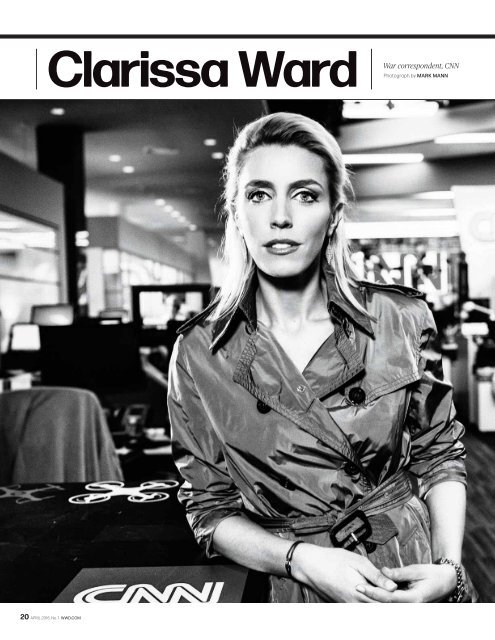You also want an ePaper? Increase the reach of your titles
YUMPU automatically turns print PDFs into web optimized ePapers that Google loves.
Clarissa Ward<br />
War<br />
correspondent, CNN<br />
Photograph by MARK MANN<br />
“ISIS cannot be contained with only a military strategy.<br />
It’s the ideology that is spreading like wildfire. You have<br />
to find a better way to counter their narrative.”<br />
MEDIA PEOPLE<br />
By Alexandra Steigrad<br />
Clarissa Ward is in New York from her base in London<br />
to talk to her U.S. colleagues about her recent<br />
six-day trip to Syria, which took six months<br />
to plan. The 36-year-old CNN war correspondent<br />
darts through the newsroom in high heels and full<br />
makeup to do quick on-air interviews. As soon<br />
as she’s off camera, Ward admits that she’s more<br />
comfortable in combat boots and a flak jacket. Ward, who won a<br />
Peabody in 2012, is perhaps best known for her reporting on Syria<br />
for CBS, which she left last fall. While working at CBS, she snuck<br />
into the war-ravaged Middle Eastern country alone, posing as a<br />
tourist. With a small camera, she covertly shot her own video. At<br />
one point, she was taken blindfolded to meet members of the Free<br />
Syrian Army. Ward’s footage shows her interviewing a coterie of machine-gun-carrying<br />
military defectors whose faces are concealed<br />
by scarves. Ward didn’t go alone on the most recent trip for CNN<br />
— she brought along a female producer, although she wouldn’t say<br />
how they got in. Both women worked with a freelance filmmaker<br />
on the ground. Here, Ward talks about why it’s preferable to be a<br />
female reporter in the Middle East, how attacks on fellow journalists<br />
like Lara Logan have influenced the way she does her job, and<br />
how Vice has impacted broadcast journalism.<br />
How many times have you been to Syria and<br />
what has changed there since your last trip?<br />
This was, like, my 14th trip. The situation in Syria<br />
continues to get worse and worse. I was very frustrated<br />
with essentially looking at these grainy You-<br />
Tube videos of what was happening on the ground<br />
and having to communicate through Skype interviews<br />
to try to get a better sense of how the Russian<br />
intervention in the Syrian conflict was playing out<br />
on the ground. We knew that the bombardment<br />
was relentless, but we didn’t have stories from the<br />
inside because it was so dangerous for journalists<br />
to go there. I spent six months trying to figure out<br />
how I could go, and then I went. It was less than 24<br />
hours before I saw an air strike on a fruit market,<br />
which brought home just how bad the situation<br />
really was. I think it’s a little bit better now since<br />
the cessation of hostilities started, and obviously<br />
encouraging that the Russians are withdrawing — or<br />
saying that they are going to withdraw.<br />
Do you think they will withdraw?<br />
I’m highly skeptical. I do think that they have a<br />
number of valid reasons for wanting to withdraw.<br />
This is a very expensive conflict and their economy<br />
is in the tank right now. Energy prices are really low.<br />
Sanctions are hitting them pretty hard. I also think<br />
that they learned some lessons from Afghanistan.<br />
They don’t want to get dragged into an endless war<br />
that they can’t necessarily win. At the same time, do<br />
I think this will be a complete withdrawal? No.<br />
What are people on the ground saying?<br />
It’s just an absolute deal-breaker that [Syrian president]<br />
Bashar al-Assad has to go. There can be no<br />
peace, no agreement until it is understood that he<br />
steps down in some capacity. Part of the problem that<br />
you have as well is that the people representing the<br />
opposition in Geneva are not necessarily a reflection<br />
of the people on the ground. So you have this disconnect<br />
with the people who are fighting and dying<br />
on the ground and the people who are hammering<br />
out deals in five-star hotels in Geneva. What a shock.<br />
How do your Syrian sources view the political<br />
climate in the U.S.?<br />
They are definitely interested in it, insofar as it<br />
may have huge ramifications or impact for them in<br />
the future. But I think that their primary feeling with<br />
regard to America is bitterness. They feel that they’ve<br />
been left to die. That basically America handed over<br />
Syria to Russia and they said, “You guys work it out.”<br />
When you see courthouses, hospitals and schools ►<br />
20 APRIL 2016, No. 1 WWD.COM<br />
WWD.COM APRIL 2016, No. 1 21


